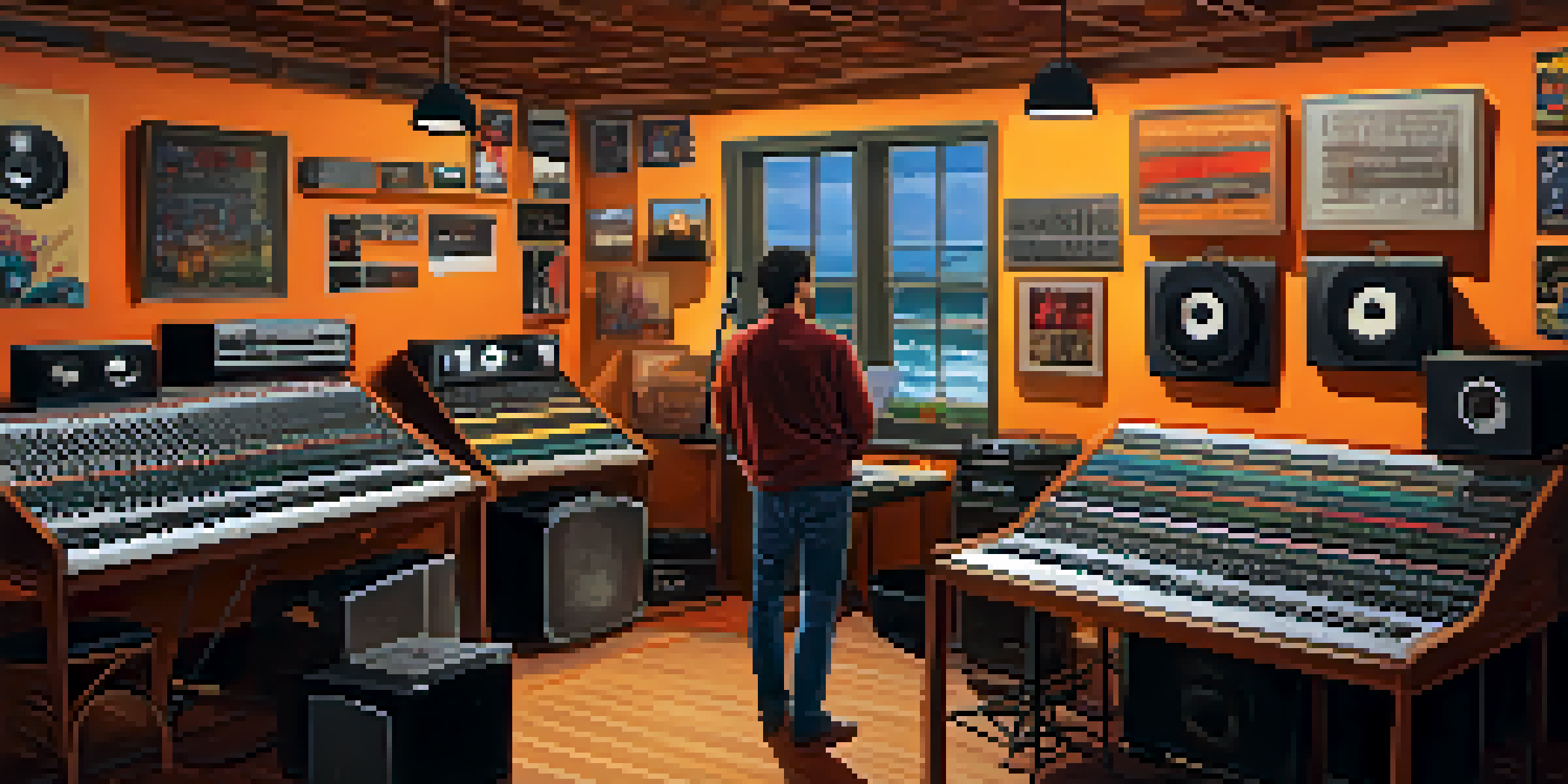Exploring the Role of Music Supervisors in Film and TV

What is a Music Supervisor and Their Key Responsibilities?
A music supervisor is a vital part of the film and TV industry, responsible for selecting and licensing the music that plays in a project. They work closely with directors, producers, and editors to ensure that the chosen music enhances the storytelling and emotional impact of the scenes. This role requires a deep understanding of both the music industry and the specific needs of the project, making it a blend of creativity and negotiation skills.
Music can change the world because it can change people.
In addition to selecting music, supervisors also handle the licensing process, which can be quite complex. They must navigate the legal aspects of music rights, ensuring that all songs used are cleared for use. This requires a strong network of industry contacts and a keen eye for detail, as even a small oversight can lead to costly delays or legal issues.
Moreover, music supervisors often collaborate with composers to create original scores or adapt existing music to fit the project’s tone. Their ability to blend different types of music—whether it’s a classic song or a contemporary hit—helps create a soundscape that resonates with audiences and elevates the viewing experience.
The Creative Process: How Music Supervisors Choose Tracks
Choosing the right music for a film or TV show is both an art and a science. Music supervisors typically start by understanding the director's vision and the emotional tone of the scenes. They often watch rough cuts of the film or series to identify key moments where music can enhance the storytelling, like an uplifting score during a victory or a somber melody in a tragic scene.

Once they have a grasp on the project's needs, supervisors dive into their extensive music libraries or scout for new tracks that fit the criteria. This process can involve listening to thousands of songs and collaborating with independent artists, record labels, and music publishers. Their goal is to find tracks that not only resonate emotionally but also align with the storyline and character arcs.
Music Supervisors Enhance Storytelling
They select and license music that elevates the emotional impact of film and TV projects.
After narrowing down their options, music supervisors present selections to the creative team for feedback. This collaborative process ensures that everyone’s vision is aligned, often leading to exciting discussions about how music can transform a scene. It’s a critical step in the creative process, as the right track can elevate the entire project.
The Importance of Licensing and Rights Management
Licensing is a crucial aspect of a music supervisor's job, as it involves securing the rights to use the selected music. Each song has different rights holders, which may include songwriters, performers, and record labels. Music supervisors must negotiate these rights to avoid any infringement, which can lead to legal complications or financial penalties.
Music is the shorthand of emotion.
This process can be time-consuming, as negotiating fees and terms often involves navigating complex contracts. It's not uncommon for supervisors to juggle multiple negotiations at once, ensuring that all music used is properly licensed. Their expertise in this area not only protects the production but also fosters strong relationships with music industry professionals.
Additionally, music supervisors need to be aware of the different types of licenses, such as synchronization licenses for film and mechanical licenses for physical media. This knowledge is essential for ensuring that the production complies with all legal requirements, allowing the project to move forward smoothly without any music-related hiccups.
Building Relationships in the Music Industry
A successful music supervisor relies heavily on their network of contacts within the music industry. Building relationships with artists, record labels, and publishers can open doors to a wealth of music options and opportunities for collaboration. These connections often lead to exclusive rights or early access to new tracks that might be a perfect fit for a project.
Moreover, a good reputation in the industry can facilitate smoother negotiations, as artists and labels are more likely to work with someone they trust. Music supervisors often attend industry events, showcases, and festivals to stay connected and discover fresh talent. This proactive approach not only expands their music library but also enriches their understanding of current trends.
Licensing is Key for Music Use
Navigating the complexities of music rights and contracts is crucial to avoid legal issues.
Ultimately, the relationships a music supervisor cultivates can significantly impact the quality of the music selection for a project. When they can present unique tracks or collaborate with emerging artists, it enhances the overall sound and feel of the film or TV show, making it stand out in a crowded market.
The Impact of Music on Audience Experience
Music plays a pivotal role in shaping how audiences experience a film or TV show. It has the power to evoke emotions, set the mood, and even foreshadow events. A well-placed song can create a moment that resonates with viewers long after the credits roll, making music supervisors key players in crafting memorable scenes.
For instance, consider the nostalgic use of a classic song in a coming-of-age film; it can instantly transport viewers back to their own memories, creating a deeper connection to the characters. Alternatively, an original score might heighten the tension during a climactic scene, keeping viewers on the edge of their seats. The right music can transform an ordinary moment into something extraordinary.
Music supervisors understand this profound impact and strive to select tracks that enhance the narrative. Their choices help define the identity of a film or series, making it feel cohesive and aligned with the story. In essence, they are the unsung heroes behind the scenes, orchestrating the sound that influences how we perceive the visual story.
Navigating Trends in Film and TV Music
The landscape of music in film and TV is constantly evolving, with new trends emerging all the time. Music supervisors must stay on top of these changes to ensure their selections resonate with contemporary audiences. For instance, the rise of streaming platforms has led to a surge in the popularity of curated playlists, influencing how music is integrated into visual media.
Moreover, the blending of genres and the use of diverse musical styles have become more common, reflecting the multifaceted nature of today's viewers. This means that music supervisors need to be open-minded and innovative, often looking for unexpected tracks that challenge traditional norms. By embracing these trends, they can create a fresh sound that captures the spirit of the times.
Relationships Drive Music Choices
Building a strong network in the music industry opens doors to unique tracks and collaborations.
Ultimately, being attuned to these shifts in the industry allows music supervisors to make informed decisions that resonate with audiences. Their ability to adapt and think outside the box can lead to groundbreaking choices that redefine how music is experienced in film and television.
The Future of Music Supervisors in the Industry
As the film and TV landscape continues to change, the role of music supervisors will likely evolve as well. With advancements in technology and new platforms for distribution, there will be increased opportunities for supervisors to showcase their skills. From virtual reality experiences to interactive storytelling, the demand for innovative soundscapes will rise.
In addition, the focus on diversity and inclusion in media is pushing music supervisors to seek out a wider range of musical voices. This trend not only enriches the storytelling experience but also allows for greater representation in the music used in film and TV. As a result, supervisors will play a key role in shaping the future sound of visual media.

Moreover, as audiences become more discerning about the music they consume, the importance of a skilled music supervisor cannot be overstated. Their expertise in curating the right tracks will continue to be essential in crafting engaging narratives that resonate with viewers. As the industry progresses, music supervisors will remain at the forefront, ensuring that music remains a powerful storytelling tool.